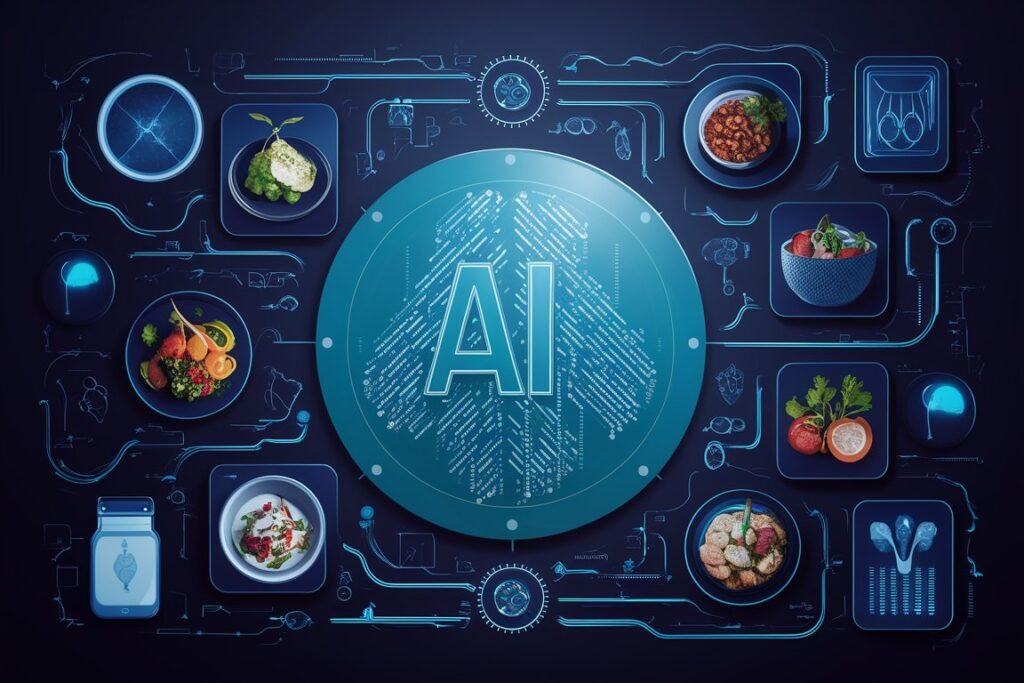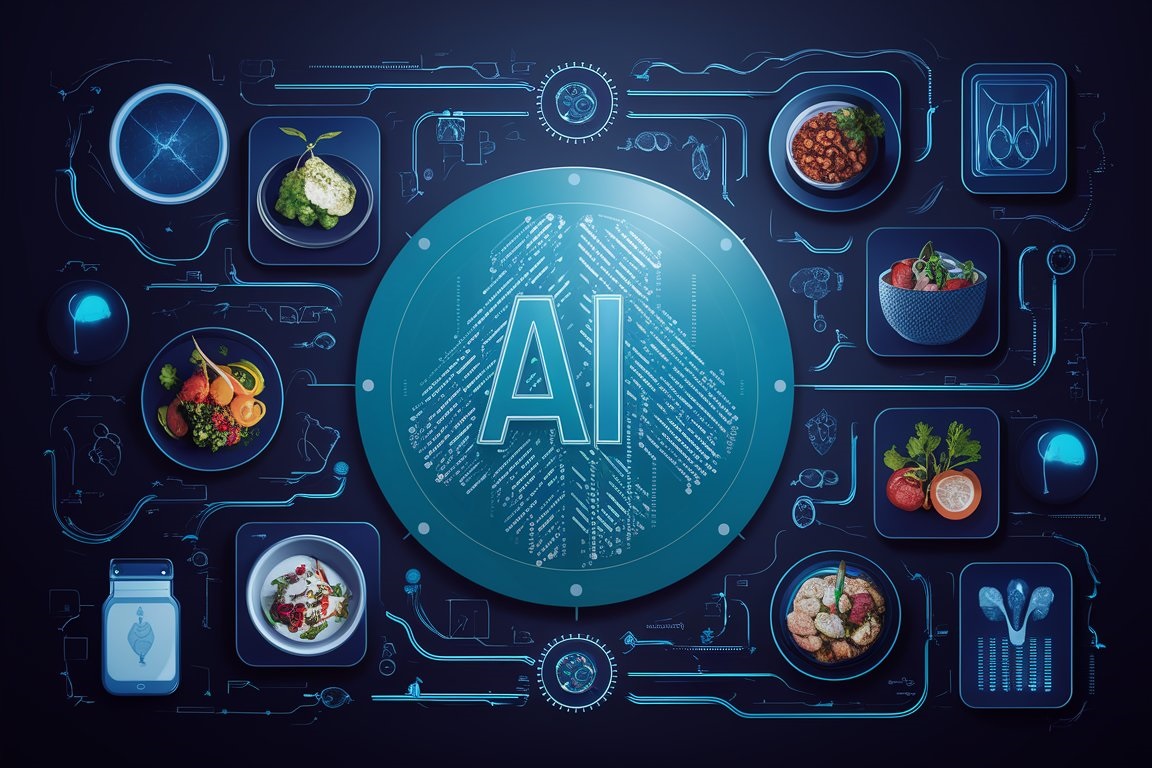
The integration of Artificial Intelligence (AI) into personalized nutrition planning represents a revolutionary shift in how we approach health and dietary habits.
By leveraging advanced AI technologies, we can provide more accurate, individualized, and dynamic nutritional advice.
“Transforming Diets with AI Insights: The Future of Nutrition”
Here are some key areas where AI is making significant strides in personalized nutrition planning.
Enhancing Personalized Nutrition Planning with AI
Data Collection and Integration
One of the foundational elements of AI-enhanced nutrition planning is robust data collection and integration. This includes genetic data analysis, where AI algorithms decode genetic information to identify specific dietary needs and potential food sensitivities.
Additionally, wearable devices that track physical activity, sleep patterns, and other health metrics provide continuous, real-time data. Integrating these diverse data sources allows for a comprehensive understanding of an individual’s health status, enabling more precise dietary recommendations.
Dietary Analysis
AI-powered tools for dietary analysis are transforming how we monitor and understand our food intake. Advanced image recognition technology can identify and log food items from photographs taken by users, streamlining the process of keeping a food diary.
Furthermore, these tools can automatically break down the nutritional content of meals based on ingredients and portion sizes, offering users a clear picture of their dietary intake without the manual effort.
Personalized Recommendations
The core of personalized nutrition planning lies in customized meal plans. AI generates these plans by considering individual health goals, dietary preferences, and restrictions.
Moreover, these recommendations are dynamic, with real-time adjustments based on ongoing health data and user feedback. This flexibility ensures that the dietary advice remains relevant and effective as the user’s health status and needs evolve.
Predictive Analytics
Predictive analytics is another powerful application of AI in nutrition planning. Machine learning models can predict health outcomes based on dietary patterns and lifestyle choices, providing users with foresight into the long-term effects of their eating habits.
Additionally, AI can assess the risk of diet-related diseases such as diabetes, heart disease, and obesity, allowing for proactive dietary interventions.
Behavioral Insights
Understanding and influencing eating behaviors is crucial for effective nutrition planning. AI analyzes user eating patterns and habits to provide personalized advice aimed at improving adherence to meal plans.
Virtual coaching and motivation driven by AI help users stay on track, offering support tailored to individual psychological and behavioral profiles.
Nutritional Genomics
Nutritional genomics explores the interaction between genes and diet. AI facilitates this by examining how different genes interact with various nutrients and tailoring diets accordingly.
Furthermore, studying epigenetic modifications—how dietary choices influence gene expression—can inform personalized plans that promote optimal health.
Gut Microbiome Analysis
AI’s role in analyzing the gut microbiome is an emerging frontier. By profiling the gut microbiome composition, AI can provide dietary recommendations that promote a healthy gut.
This includes personalized suggestions for probiotics and prebiotics, which are crucial for maintaining gut health and overall well-being.
Food Preferences and Allergies
AI helps manage food allergies and intolerances by identifying potential allergens and tailoring diets to avoid them.
It also learns individual taste preferences, using machine learning algorithms to customize meal plans that are both healthy and enjoyable.
Nutritional Psychology
AI addresses the psychological aspects of eating by analyzing emotional triggers for eating and providing strategies to manage them.
Incorporating mindfulness practices into AI-driven recommendations promotes healthier eating behaviors, focusing on the psychological well-being of the user.
Community and Social Interaction
Lastly, AI can enhance the social aspect of nutrition planning by creating peer support networks. These networks connect users with similar dietary goals and challenges, fostering a sense of community and shared motivation.
Analyzing social eating patterns also helps tailor recommendations for social situations, ensuring users can maintain their dietary plans in various settings.
Start Your Journey: 10 Free Classes
AI Tools for Personalized Nutrition Planning
Here is a list of AI tools that can be utilized for personalized nutrition planning:
- Nutrigenomics Platforms:
- DNAfit: Provides personalized diet and fitness plans based on genetic testing.
- Orig3n: Offers DNA tests for personalized nutrition insights.
- Dietary Analysis Tools:
- Foodvisor: Uses AI-powered image recognition to analyze food photos and provide nutritional information.
- Bite AI: Analyzes meal photos to log food intake and nutritional content automatically.
- Wearable Devices and Health Trackers:
- Fitbit: Tracks physical activity, sleep patterns, and provides dietary logging features.
- Apple Watch: Monitors health metrics and integrates with various nutrition apps for personalized insights.
- AI-driven Meal Planning Apps:
- EatLove: Creates personalized meal plans based on individual health data and dietary preferences.
- PlateJoy: Uses AI to customize meal plans and grocery lists according to user goals and preferences.
- Predictive Analytics Platforms:
- Nutrino: Uses AI to provide personalized dietary recommendations and predict health outcomes.
- Wellory: Offers personalized nutrition coaching with real-time adjustments based on user data.
- Gut Microbiome Analysis:
- Viome: Analyzes gut microbiome and provides personalized dietary recommendations.
- DayTwo: Uses microbiome data to tailor dietary advice for blood sugar control.
- Health and Wellness Apps:
- MyFitnessPal: Uses AI to analyze dietary habits and provide personalized recommendations.
- Lifesum: Tracks food intake and physical activity, offering tailored nutrition advice.
- Virtual Nutrition Coaches:
- Lumen: Uses AI to analyze metabolism through breath analysis and offers personalized dietary suggestions.
- Noom: Combines AI and human coaching to provide personalized weight loss and nutrition plans.
- Nutritional Genomics Tools:
- Genopalate: Provides personalized nutrition insights based on genetic analysis.
- Nutrigenomix: Offers DNA-based dietary recommendations tailored to individual genetic profiles.
- Mental Health and Behavioral Insights:
- Wysa: An AI-driven chatbot that offers mental health support and can be integrated with nutrition plans to manage emotional eating.
- Woebot: An AI-powered mental health tool that can help users manage stress and improve their relationship with food.
- Community and Social Interaction Platforms:
- Habit: Uses AI to create personalized nutrition plans and connects users with similar goals.
- Spoon Guru: Provides dietary advice and helps users find suitable food products, fostering a community of users with similar dietary needs.
- Personalized Supplement Recommendations:
- Care/of: Uses a questionnaire to provide personalized vitamin and supplement recommendations, integrating AI to adjust recommendations over time.
- Persona: Offers personalized supplement plans based on health data and lifestyle factors.
These AI tools leverage advanced technologies to offer personalized nutrition plans tailored to individual needs, preferences, and health data. By utilizing these tools, individuals can achieve better health outcomes through customized dietary advice and support.
Key Considerations Before Implementing AI in Personalized Nutrition Planning
Before implementing AI in personalized nutrition planning, several important factors should be carefully considered to ensure effectiveness, reliability, and ethical use:
- Data Privacy and Security:
- Compliance: Ensure compliance with data protection regulations (e.g., GDPR, HIPAA) to safeguard user information.
- Data Encryption: Utilize strong encryption methods to protect sensitive health and genetic data from unauthorized access.
- Accuracy and Reliability of AI Algorithms:
- Validation: Verify the accuracy and reliability of AI algorithms through rigorous testing and validation against established scientific guidelines.
- Transparency: Ensure transparency in how AI algorithms make recommendations and the sources of data used to generate personalized plans.
- Ethical Considerations:
- Bias Mitigation: Address potential biases in AI algorithms that may disproportionately affect certain demographic groups or dietary preferences.
- Informed Consent: Obtain informed consent from users regarding the use of their data for personalized nutrition planning and ensure clarity on how their data will be used.
- Integration with Existing Health Data:
- Compatibility: Ensure compatibility and seamless integration with existing health records, wearable devices, and other health monitoring tools to provide a holistic view of the user’s health status.
- Interoperability: Facilitate interoperability with other healthcare systems and platforms to enable data sharing and continuity of care.
- User Engagement and Behavior Change:
- User-Centered Design: Design AI-driven tools with a user-centered approach to enhance engagement and adherence to personalized nutrition plans.
- Behavioral Insights: Incorporate behavioral science principles to promote sustainable behavior change and adherence to dietary recommendations.
- Regulatory Considerations:
- Regulatory Approval: Ensure compliance with regulatory requirements for health-related AI applications in different jurisdictions.
- Clinical Validation: Validate AI-driven nutrition plans through clinical studies and trials to demonstrate efficacy and safety.
- Scalability and Cost Efficiency:
- Scalability: Evaluate the scalability of AI-driven nutrition planning solutions to accommodate varying user volumes and geographic locations.
- Cost-effectiveness: Assess the cost-effectiveness of implementing AI tools compared to traditional methods of personalized nutrition planning.
- Professional Oversight and Collaboration:
- Healthcare Provider Involvement: Involve healthcare professionals (e.g., dietitians, nutritionists) in the development and implementation of AI-driven nutrition plans to ensure clinical relevance and accuracy.
- Collaboration: Foster collaboration between AI developers, healthcare providers, and nutrition experts to optimize AI tools for personalized nutrition planning.
- Long-term Sustainability and Maintenance:
- Updates and Maintenance: Plan for regular updates and maintenance of AI algorithms to incorporate new research findings and technological advancements.
- Long-term Support: Provide ongoing support to users and healthcare providers to address questions, concerns, and feedback related to AI-driven nutrition planning.
- User Empowerment and Education:
- Education: Empower users with knowledge about how AI is used in personalized nutrition planning, including its benefits, limitations, and potential risks.
- Support Resources: Provide educational resources and support materials to help users make informed decisions about their dietary choices and health management.
By carefully considering these factors, stakeholders can maximize the benefits of AI in personalized nutrition planning while addressing potential challenges and ethical considerations to ensure safe, effective, and user-centric applications.
In conclusion, AI’s integration into personalized nutrition planning offers unprecedented opportunities for creating more precise, adaptable, and holistic dietary advice.
By focusing on these key areas, AI can significantly enhance the effectiveness of nutrition planning, leading to better health outcomes and improved user satisfaction.
Click here to read more “How To Use AI in Your Business“.


